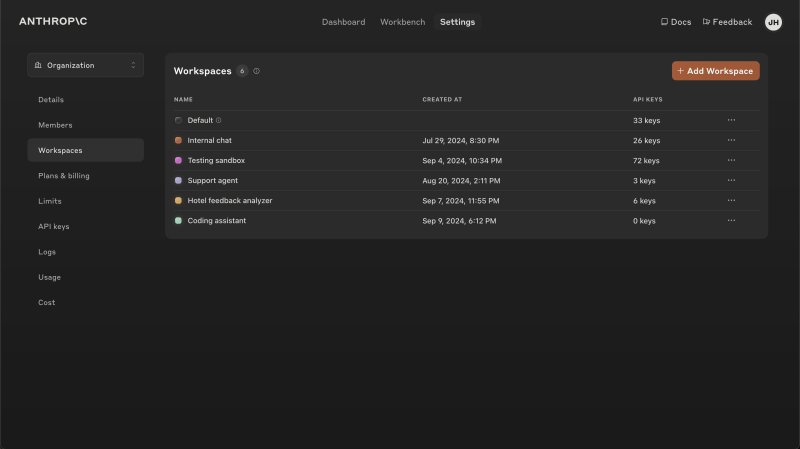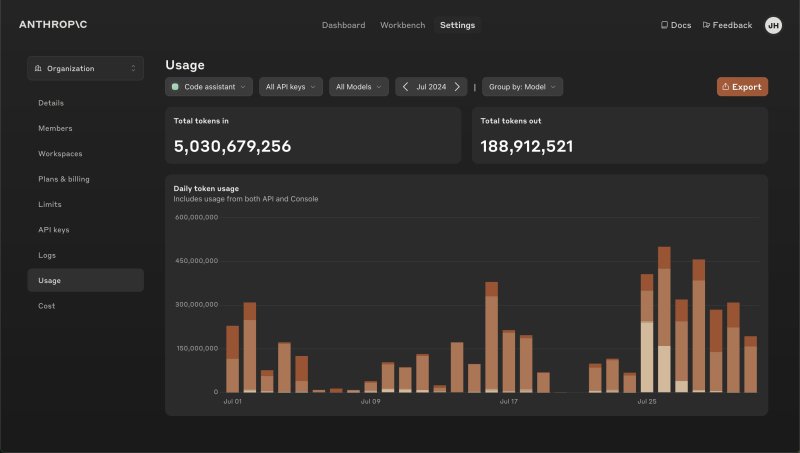Is Anthropic’s new ‘Workspaces’ feature the future of enterprise AI management?
Join our daily and weekly newsletters for the latest updates and exclusive content on industry-leading AI coverage. Learn More
Anthropic, the artificial intelligence startup backed by tech giants like Amazon and Google, is upping the ante in the fiercely competitive enterprise AI market. The company has unveiled Workspaces, a new feature in its API Console that promises to give businesses unprecedented control and flexibility over their AI deployments.
This move comes just weeks after Anthropic launched Claude Enterprise, its high-powered AI assistant designed for corporate use. The rapid-fire release of enterprise-focused tools signals Anthropic’s determination to carve out a significant share of the lucrative business AI market, currently dominated by firms like OpenAI, Microsoft, and Meta.
Workspaces allows organizations to create and manage multiple isolated environments for their Claude AI deployments. This addresses a crucial pain point for businesses scaling their AI operations: the need for granular control over spending, usage, and access across different projects or departments.

The battle for enterprise AI supremacy heats up
The introduction of Workspaces is a strategic move in the increasingly heated battle for enterprise AI dominance. OpenAI’s ChatGPT Enterprise, launched a year ago, has already gained significant traction among Fortune 500 companies. Google’s Gemini for Workspace, announced in February, offers deep integration with the tech giant’s popular productivity tools.
Anthropic’s approach differs by focusing on expanded context windows and now, granular deployment control. Claude Enterprise boasts a 500,000 token context window, far surpassing competitors. This allows Claude to process and understand vast amounts of corporate data in a single interaction, potentially offering more comprehensive insights for complex business scenarios.
The addition of Workspaces further differentiates Anthropic’s offering. By allowing businesses to create separate environments for development, staging, and production — each with its own spending limits and access controls — Anthropic is addressing the real-world complexities of enterprise AI deployment.

Navigating the complexities of AI integration in the corporate world
As businesses rush to adopt AI technologies, they face significant challenges in integrating these powerful tools into existing workflows while maintaining security and compliance. Workspaces aims to ease this transition by providing a more nuanced approach to AI management.
For instance, a company could set strict budget limits for experimental AI projects without risking overspend that could impact mission-critical applications. Similarly, the ability to assign different access levels to team members enhances security and compliance efforts — a crucial consideration as AI systems gain access to increasingly sensitive corporate data.
However, the true test of Workspaces’ value will come as businesses begin to implement it at scale. The complexity of enterprise IT environments means that any new tool, no matter how promising, must prove its worth in real-world scenarios.
The road ahead: Balancing innovation and control in enterprise AI
Anthropic’s latest move highlights a growing trend in the AI industry: the need to balance rapid innovation with the control and security measures that enterprises require. As AI capabilities expand at a breakneck pace, tools that allow businesses to harness this power responsibly will likely become increasingly valuable.
The coming months will be crucial for Anthropic as it seeks to establish itself as a major player in the enterprise AI market. The company’s ability to attract and retain large corporate clients will depend not just on the raw capabilities of its AI models, but on the robustness and flexibility of its management tools.
For businesses, the proliferation of enterprise AI options presents both opportunities and challenges. The rapid pace of innovation means more powerful tools are constantly becoming available. However, it also requires careful evaluation to ensure that chosen solutions can scale effectively and integrate seamlessly with existing systems.
As the AI arms race in the enterprise sector intensifies, one thing is clear: the winners will be those who can not only push the boundaries of AI capabilities but also provide the control and flexibility that businesses need to deploy these powerful tools effectively and responsibly.
Source link



